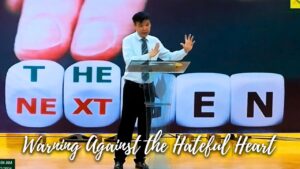A PARABLE OF OUR CALLING
Jonah 1
1 The word of the Lord came to Jonah son of Amittai:
2 “Go to the great city of Nineveh and preach against it, because its wickedness has come up before me.”
3 But Jonah ran away from the Lord and headed for Tarshish. He went down to Joppa, where he found a ship bound for that port. After paying the fare, he went aboard and sailed for Tarshish to flee from the Lord.
4 Then the Lord sent a great wind on the sea, and such a violent storm arose that the ship threatened to break up.
5 All the sailors were afraid and each cried out to his own god. And they threw the cargo into the sea to lighten the ship. But Jonah had gone below deck, where he lay down and fell into a deep sleep.
6 The captain went to him and said, “How can you sleep? Get up and call on your god! Maybe he will take notice of us so that we will not perish.”
7 Then the sailors said to each other, “Come, let us cast lots to find out who is responsible for this calamity.” They cast lots and the lot fell on Jonah.
8 So they asked him, “Tell us, who is responsible for making all this trouble for us? What kind of work do you do? Where do you come from? What is your country? From what people are you?”
9 He answered, “I am a Hebrew and I worship the Lord, the God of heaven, who made the sea and the dry land.”
10 This terrified them and they asked, “What have you done?” (They knew he was running away from the Lord, because he had already told them so.)
11 The sea was getting rougher and rougher. So they asked him, “What should we do to you to make the sea calm down for us?”
12 “Pick me up and throw me into the sea,” he replied, “and it will become calm. I know that it is my fault that this great storm has come upon you.”
13 Instead, the men did their best to row back to land. But they could not, for the sea grew even wilder than before.
14 Then they cried out to the Lord, “Please, Lord, do not let us die for taking this man’s life. Do not hold us accountable for killing an innocent man, for you, Lord, have done as you pleased.”
15 Then they took Jonah and threw him overboard, and the raging sea grew calm.
16 At this the men greatly feared the Lord, and they offered a sacrifice to the Lord and made vows to him.
17 Now the Lord provided a huge fish to swallow Jonah, and Jonah was in the belly of the fish three days and three nights.
The life of Jonah.
God called prophets to either prophesy in favor of, or against a group of people and nations.
He called:
- Nehemiah, Jeremiah, Ezekiel, Daniel, Joel, Habakkuk, Zephaniah, Haggai, Zechariah and Malachi – to prophesy to Judah.
- Isaiah – to prophesy on the fate of Israel.
- Hosea and Micah– to prophesy to Judah and Israel.
- Amos –to prophesy to Syria, the Philistines, Tyre, Edom, the people of Ammon, and Moab.
- Obadiah – to prophesy tothe Edomites.
- Nahum – to prophesy to Nineveh for the Jews there.
God called Jonah to deal with his heart.
The book of Jonah is a book in the Bible that ends with a question. (?)
The ending of the book of Jonah is a cliffhanger which concludes with God asking a question and not us knowing what Jonah’s response is to God. God said: “And should I not have concern for the great city of Nineveh, in which there are more than a hundred and twenty thousand people who cannot tell their right hand from their left – and also many animals”?
Title: A PARABLE OF OUR CALLING.
- The Call of God
- Our Steadfast Stubbornness
- The Remarkable Reformation
I. THE CALL OF GOD
Jonah 1: 1 “The word of the Lord came unto Jonah.”
God spoke to Jonah in His own unique and powerful way and He told Jonah to do two things. First, go to Nineveh; second, cry out against it – that is, rebuke them for their sin and call them to repentance.
The call of God is:
- A Divine call.
Without it no service should ever be attempted; with it no service should be avoided.
The generosity of the thought was Divine, not human. If we are true Israelites, we shall not precede the cloud, but follow it. The attitude of those who would be true prophets should be that of Samuel, when he said, “Speak, Lord; for thy servant heareth.” And like Isaiah who said, “Here I am, send me.”
- A Secret call.
Jonah was not commissioned by courtiers, or by ecclesiastics, or by a popular assembly.
It is a frequent experience with a Christian to get instruction as to what he should do, when he enters into the closet, shuts the door, and prays to the Father who sees in secret.
Nineveh was at this time in the zenith of its glory. Rich, corrupt, and godless, it was the center and focus of evil. Even in these gentler times, and amidst more phlegmatic people, moral courage is required by those who rebuke popular sins.
Every believer is the called out ones – called to a “Nineveh”
Nineveh in Hebrew means abode of Ninus; exterior growth; growing vigor; colonization; coordination; education of youth; handsome; agreeable.
In the Bible, Nineveh was a large pagan city associated with sin and vices that symbolized enmity with God.
What is our response to that call to “Nineveh”?
II. OUR STEADFAST STUBBORNNESS
Jonah 1: 3 But Jonah arose to flee to Tarshish from the presence of the LORD. He went down to Joppa, and found a ship going to Tarshish; so he paid the fare, and went down into it, to go with them to Tarshish from the presence of the LORD.
We know our calling but there are barriers that hinder us.
What are the barriers:
- Ethnocentricity.
It refers to a belief that your culture or ethnic group is superior to another’s. It leads to extreme pride and lack of concern for others. E.g. Racism
- The Issue of Pride and Prejudice vs. Loving Without Partiality.
Without partiality means without favoritism.
Prejudice means prejudgment or preconceived idea.
We have prejudices and partiality because:
- We only love people who like us.
- We call the clean unclean.
- Wounds of the past.
If we want to reach out to souls, we must put off partiality.
Ethnocentrism is a sin. All men and women are made in the image of God. Jesus did not lay down His life for a particular race, culture or tribe. He came to save the world, both Jews and Gentiles.
“There is neither Jew nor Greek, slave nor free, male nor female, for you are all one in Christ Jesus.” Galatians 3: 28.
- Encampment.
It refers to temporary accommodations. It refers to comfort and delight.
- The Issue of Blessing vs. Being a Blessing.
We are blessed to be a blessing – to produce disciples or people who would see God as we see Him.
DELIGHTS and DUTIES.
Delights are those we like most and make us happy. They are called blessings.
Duties are what we are supposed to do. Sometimes duties are things we like to avoid.
The Temple was a delight to Jonah since he recognized he is a creature in God’s creation, a human in God’s image and a Hebrew in God’s covenant.
He declared: “When my life was ebbing away, I remembered you, Lord, and my prayer rose to you, to your holy temple. “Those who cling to worthless idols turn away from God’s love for them. But I, with shouts of grateful praise, will sacrifice to you. What I have vowed I will make good. I will say, ‘Salvation comes from the Lord.’”
Nineveh was his duty. But he hated Nineveh so he ran away.
A little geography:
The contrast between Nineveh and Tarshish was vast. Nineveh was located east of the Tigris River in modern-day Iraq. It was more than 500 miles east of Jonah’s hometown. Tarshish, in contrast, was west of Gath-hepher. It is a city near Gibraltar in the southern part of Spain. In fact, Tarshish stood more than 2,500 miles from Israel in the opposite direction of Nineveh.
Jonah’s reason for running was that, he did not like the Assyrians. Assyria was an idolatrous, proud, and ruthless nation bent on world conquest and had long been a threat to Israel.
Jonah specifies his reason for resistance: “That is why I was so quick to flee to Tarshish. I knew that you are a gracious and compassionate God, slow to anger and abounding in love, a God who relents from sending calamity” (Jonah 4:2).
Jonah wanted Nineveh to be destroyed. He didn’t want to see God’s mercy extended to his enemies, and he knew in his heart that God’s intention was to show mercy.
We are blessed to have a temple/church and we always delight in the presence of God here but we may also find ourselves running away from “Nineveh” our duty.
Psalm 67: 1-2 “May God be gracious to us and bless us and make his face shine on us— so that your ways may be known on earth, your salvation among all nations.
The TOPLINE and the BOTTOMLINE.
The Top line: God will bless us – God’s blessing is our delight.
The Bottomline: that He may be known on earth – is our duty.
God has called us to be a blessing to nations – that the world may know Jesus.
- Entanglement
2 Timothy 2: 4 No one serving as a soldier gets entangled in civilian affairs, but rather tries to please his commanding officer.
There are desires of the flesh and there are God’s appointments.
- Desire of the Flesh vs. Leading of the Spirit
Jonah 4:6 – Then the Lord God provided a leafy plant and made it grow up over Jonah to give shade for his head to ease his discomfort, and Jonah was very happy about the plant.
Jonah was motivated by material comfort. But God made 3 appointments to lead him out of his comfort zone:
God appointed a fish to swallow him.
God appointed a worm which chewed the plant.
God appointed the scorching heat.
Jonah had a misplaced compassion. He was stubborn with no repentance and God dealt with his heart.
III. THEREMARKABLE REFORMATION
Nineveh needs salvation but Jonah needs reformation. He cannot reach others because he has heart issue. Nineveh is the lost that needs salvation and Jonah is you and me who needs reformation.
We can do a mission without touching a heart and we can fulfill our mission with an untouched heart. Our hearts need help.
We are living in the last days and the Bible is very clear. 2 Timothy 3: 1- 4“This know also, that in the last days perilous times shall come. For men shall be LOVERS OF THEIR OWN SELVES, covetous, boasters, proud, blasphemers, disobedient to parents, unthankful, unholy, Without natural affection, trucebreakers, false accusers, incontinent, fierce, despisers of those that are good, Traitors, heady, high-minded, LOVERS OF PLEASURES MORE THAN LOVERS OF GOD;”
Many of those who are called have lost their purpose because their hearts have been corrupted.
Because of pleasures and comfort, like Jonah, our hearts become corrupt and we misplaced our compassion.
- We have become lovers of our own selves.
- We may want to serve God, but in our own terms and not on His terms.
- We give more value to our delights and never on our duties.
- We have become engrossed with the top line and take the bottom line for granted.
Therefore, God deals with what we value most and when He does, it hurts, sometimes terribly. But God’s dealings are ways of bringing us back to our calling.
God has a way and even made a perfect appointment for you.
Two Thousand years ago, God seta once and for all appointment, a once and for all dealing for our sake. God let go of His most valued One, dealt with His own Son severely on the cross even though He was perfectly obedient so that we don’t have to be anxious when life is not pleasant. We don’t have to run after temporary pleasures. So that our hearts will be free from corruption.
Jesus the Son of God chose to walk the road towards Calvary even when it meant death. His obedience compensated our disobedience. His willingness for our unwillingness. His righteousness for our corruption.His submissiveness for our stubbornness. His love for our misplaced compassion.
This generation needs a miraculous sign but there will be no sign except that of the prophet Jonah who was in the belly of the whale for 3 days.
AndOne greater than Jonah has come -JESUS. He went down into the belly of the earth for 3 days. He knew why He had to be in the belly of the earth, He knew and fulfilled His mission and that is to conquer death and take those who have died righteous out of death to bring them to heaven. And on the 3rd day He came out of the belly of the earth through His Resurrection to announce the good news to “Nineveh” – Those who are in sin and vices.
Bad news: “Nineveh will be judged.”
Good news: the judgment of God against “Nineveh” had been poured on him on the cross.
Ultimatum: “In forty days…”
Celebration: He spent the next forty days, after His resurrection, with His disciples, giving them hope, not judgment and empowering them for the task ahead, turning all believers into a chosen generation who will take the heart of God to the lost.
“Nineveh” needs good news and it needs people who will not look at them from afar waiting for God’s judgment. Sinners need someone who wants to be near them. They need Jesus, they need you.
CONCLUSION:
God showed Nineveh his mercy by sending a stubborn prophet to preach a message reluctantly but it was His grace towards the sinful city that saved it.
It is still the grace of God that gave the 2nd chance to Jonah. There were dealings along the way but there was grace.
Today, many of us need the grace of God because we also feel like we are the Jonah of this generation, we know what God wants us to do but we are always running away doing what we like and maybe doing God’s things in our own terms.
God called Jonah though He knew he was stubborn. He still chose him when others could have been better.
If God looks for perfect people to serve Him, there will be none. So as imperfect as you are God has chosen you.





